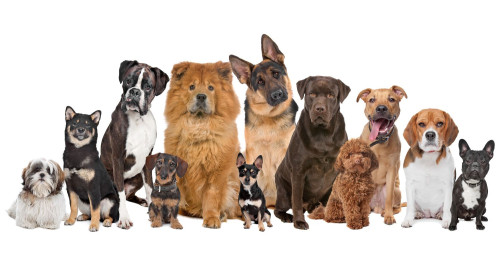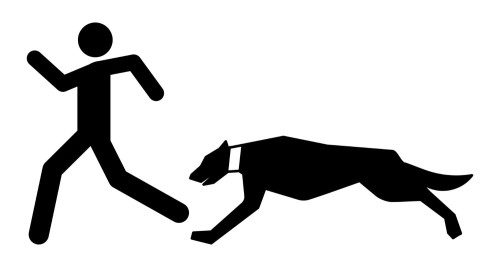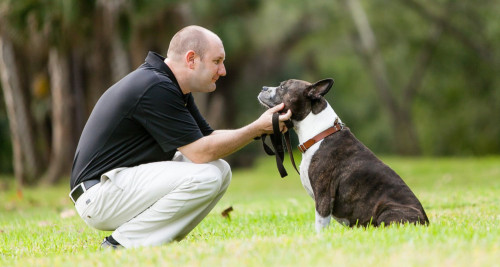Chihuahua
The American Kennel Club (AKC) did not register a Chihuahua until 1904.
The breed’s popularity exploded when Taco Bell chose “Gidget”, a female Chihuahua for its mascot. Movies like “Beverly Hills Chihuahua” and “Legally Blonde” have made them more popular than ever.
Breed Traits and Characteristics
According to the American Kennel Club, here are some breed characteristic you can find in Chihuahuas.
- Height
5-8 inches
- Weight
Not exceeding 6 pounds
- Life Expectancy
14-16 years
- Coat Type/Length
Smooth/Short-Medium
-
80 Affectionate with Family
-
20 Good with Young Children
-
60 Good with Other Dogs
-
60 Trainability Level
-
80 Energy Level
-
100 Barking Level
-
40 Shedding Level
-
20 Drooling Level
History
The Chihuahua's history is complicated and sketchy at best. There are many thoughts and theories in relation to the origin of the breed. Archeologic diggings have unearthed what seems to prove that the breed originated in Mexico. The most common and most likely theory is that Chihuahuas are descended from the Techichi, a companion dog favored by the Toltic civilization in Mexico and the smaller hairless dog brought from Asia to North America via Alaska.
There are no records of the Techichi available before the 9th century, although artifacts dating back to 300 BC have been located, buried as part of the western Mexico shaft tomb tradition. Which are thought to depict Techisis society that buried the pets along with their owners.
There is also proof that the Chihuahua’s were used as living hot water bottles. Anyone who lives with a Chihuahua will understand why that is more than likely fact.
The Chihuahua
The Chihuahua may be small in stature but is large in personality. Although considered the world’s smallest dog, its spunky, adventurous and loyal personality makes it one of the most loved toy dogs. Nicknamed “Chis”, this breed has grown to be the fourth largest in popularity. Bark Buster trainers are often called upon to deal with this breed’s yappiness and tendency to be aggressive if not trained or socialized properly. (see tips on correct way to socialize this breed in this article)
Why is this breed so popular among toy dog lovers? Its extreme devotion to its master, its look of vulnerability and love of affection make it a great companion dog.
If you decide a Chihuahua is your breed, be prepared to have your dog follow you around wherever you go. Going shopping? Better put him in your purse as you roam around the mall. Want to make dinner? Be prepared to have a mini chef at your feet. Going to sleep? Chihuahuas will burrow themselves under the covers right next to you as fast as they burrow into your heart.
Chihuahuas have one of the longest life spans compared to other breeds. If you adopt a Chihuahua, you can expect it to live until at least 15. In fact, the oldest Chihuahua ever, lived a full 20 years, 265 days old, and was named “Megabyte.” Another reason people love this breed stems from their wide range of colors with blue, brown, chocolate and black being the most common.
Remember that with any toy breed, you have to be careful because they can be easily injured by stepping on them or jumping out of your arms. Because they are small, they are easy prey for coyotes, hawks, wild pigs, etc. Never leave them unattended in your back yard because if there is a tiny hole in your fence, they’ll find a way to squeeze through. As bold explorers, they can fit in places other puppies or dogs can’t fit.
Hawks have been known to swoop down and capture this breed, so keep them safe.
Chihuahua Breed Facts
Management
Dog owners beware: if you pamper your pooch too much, he can become aggressive and bark incessantly at both people and other animals. Without proper training, this breed can become very demanding. They don’t respond well to negative reinforcement. Instead, a firm tone establishing yourself as the boss right from the start will help to prevent many misbehaviors.
If you don’t want endless yapping or biting and aggressive misbehaviors, start training and socialization early. You’ve heard the phrase “dynamite comes in small packages”? Their natural distrust of strangers can create a nasty temperament if not stopped early on.
Also, too often they don’t know how small they are and will take on a breed twice their size. Fast learners, Chihuahua’s can compete in obedience and agility trials with the same finesse as much larger breeds.
They can be hard to house train. Because they do not like the cold or rain, getting them to potty outdoors in bad weather can be challenging.
Socialization at a young age is extremely important for these dogs. Try to expose them to different people, sights, smells and experiences so that you have a well-rounded and happy dog.
Personality & Temperament
It is the chihuahua’s feisty nature that usually gets him in trouble. Chihuahuas never back down from a fight, even when encountering a larger, aggressive dog. Therefore, you need someone who can train this dog correctly, finding a happy medium between being a good watch dog yet not being aggressive. This breed will run your life if you let them. As the “leader of the pack”, you have to establish the rules and boundaries or they will take over.
Because this breed is so tiny and somewhat fragile, you need to be extremely careful with a Chihuahua around younger children. It is very important that you don’t leave young children alone with your chihuahua because they could be easily snapped at, nipped at or bitten. Also, toddlers can play rough thinking this dog is like a doll. Chihuahuas can easily be injured with rough play.
Points of Interest
Chihuahuas make ideal companions for people who live in apartments or don’t have a large yard. Know that Chihuahuas are not tolerant of cold weather and would prefer to be in the warm indoors, snuggled under a warm blanket. Cold and Chihuahuas don’t mix which is often why you see them bundled up in sweaters. If you don’t curb their natural tendency to bark a lot with the right training at the onset, other dwellers in the apartment complex may complain.
- Adults usually weigh less than 10 pounds
- Smallest dog breed in the world
- Easy to carry around or as a travelling mate
- Wonderful go everywhere companions
- Adapt well to apartment living
- Have either long or short coats
- Easy to groom
- Long life span (up to 18 years)
- Come in a variety of colors
- Warm weather dogs
Bark Busters Trainer Ruth Marquardt on Chihuahuas
A Case Study on Socialization
The Chihuahua can conjure up images of a sweet little dog cuddled up with its owner, or a snarling little “ankle biter”, depending on who you ask. Why are some Chihuahuas perfectly well-behaved, and others seem to hate everyone but their owners? The answer lies in two areas: socialization and training.
Carly was a great dog and she fit right in, sleeping at the foot of their bed each night and sitting on their laps every chance she got. She was like their child, and they treated her just like their child, looking to give her everything her heart desired.
Chihuahuas, as with other dogs, need to be well-socialized, and the best time to do that is when they are puppies. When a puppy is born, he has no preconceived idea of whether people are good or bad. A puppy must be socialized by taking it into public often when it is young. He must have many positive experiences early on in order to view people as a positive influence.
She would then greet them wildly on their return, as if they had been gone for weeks. Apart from that, their lives together were fun and Carly was always just one step behind them, asleep on their lap or asleep in their bed. She was so loving, they saw no reason not to give her everything she wanted.
There is also a misconception that small dogs don't have to be trained. I tell my clients all the time that if they are relying on picking up their dogs in order to control them, then if they can't catch them they have no control. Sit on the floor or on a low chair often with your Chihuahua. Height is status to a dog, so if you are lower to the ground, you are less threatening. Call him with a fun voice! If they think that there is something good that will happen, they will be much more likely to come to you. Always use lots and lots of praise when they listen!
Sarah and James were confused as to why she had suddenly gone from being so good, to being so bad.
Sitting on the floor is also a great way to pet your dog. Remember, height is status to a dog. But people with small dogs (Chihuahuas being one of the smallest) pick up their dogs a lot! To a Chihuahua, he thinks you are giving him more status. Picking him up when he is doing something wrong then, really gives him the wrong idea. Even sitting on your lap is status to a dog, so he should only jump up onto your lap if you invite him first. Otherwise you may find your Chihuahua growling at other dogs or even your children when he's in your lap. If you can get your dog to come to you every time, then you will not need to pick him up to control him, just to love him.
This 12-month milestone in dogs usually coincides with reaching maturity. They hit that age of maturity, full grown, where they are now ready to work out the pecking order and to work out where they fit in the family unit, their position in the household, if you like. What they decide depends on how we behave and what we tell them via our actions and behavior.
Often, I find small dogs are afraid to be picked up and will run away from the owner. This is usually a case of the owner overhandling his dog, such as picking him up to put him someplace where he doesn't want to go, or even handing him to someone he doesn't know! Dogs need to know their owners will keep them safe, and handing the dog to a perfect stranger to get him over his fear will only make him afraid of being handled. First, he has to know his owner will keep him safe, and then he will learn he doesn't have to worry about strangers, because the owner will make the decision for him.
The reason she took so long to get to that point was due to her lack of maturity. Until 12 months, she was not ready to act to claim her position until she reached the maturity needed to hold that position.
Finally, remember that a Chihuahua is a dog, not a child in a fur suit. They learn by association, so if they get a positive reaction from you, they will likely repeat that action. A negative reaction will help them to avoid that behavior. Teach your dog to follow you and come when he is called, and you will be well on the right path to a well-behaved dog, one that everyone can enjoy!
Sarah and James had also made another fatal mistake of never separating from her when they were home. She slept in their bed, sat on their laps, and followed them from room to room, making the only time they left her alone was when they left for work.
Bark Busters Trainer Jeff Drier on Chihuahuas
The right training for your Chihuahua
This breed needs gentle and consistent training to control any aggression, nipping or barking as well as any tendency he has to fight with other dogs. The Chihuahua is generally not the most social dog with others outside their family and rarely with other dogs, unless they have accepted them into the family. Therefore training is required in many cases, but it does not need to be regimented but it needs to be consistent and focused on the issues your dog has.
Our methods are very compatible with this breed as we don’t have to just rely on treats to train, we also use communication. The Chihuahua is a very finicky eater and it will usually ignore treats as being any incentive to do anything.
Always start any training with your dog slowly, gradually and try not to pick your dog up to control its behavior. This can make them more determined to still do that which it always did but just then try to avoid your hands and run away.
The Chihuahua has been known to jump straight out of their doggie-parents hands to get to someone entering the home, seriously injuring itself as a result.
Many doggie-parents might think that training is unnecessary or pointless, but that would be akin to not seeking some form of education for your children. The facts are you owe it to your dog to educate it if you can, or you seek professional help if you can’t. Remember that your dog would have received ‘canine education’ if it had remained with its mother and litter mates. You have a responsibility to now complete its education.
Although we often hear about Labradors or German Shepherds being service dogs, don’t rule out the Chihuahua who is quite capable as well. Chihuahuas are intelligent and can be trained when it is done with a gentleness, patience and kindness.
Their large, round eyes are expressive and their single-minded determination makes them good at a variety of activities when they put their mind to it.
- Very territorial
- Good watchdogs
- Loves frequent attention
- Survive best in warmer climates
- Escape artists
- Can be suspicious of strangers or other dogs if not socialized properly
These diminutive dogs have personality plus and are experts at getting their way. They often do it by being very sweet and loving, jumping into their owner’s laps and snuggling in for hours at a time.
Multiple Dog Households
I vividly remember a very nice woman we worked with who had five Chihuahuas. To her they were like potato chips, she couldn’t have just one. She called us because she couldn’t have a cup of coffee or read her newspaper without the dogs being all over her. She loved them and the snuggling and cuddling with them but at times wanted to be left alone to enjoy her morning coffee or sit in her sunroom and read.
We spent a little time getting to know her and her dogs and watched as they continuously demanded and received her attention. Her biggest problem was that her dogs didn’t respect her. Because they didn’t respect her, they didn’t respect her space.
Chihuahuas Are Very Clever at Getting Their Own Way
One of them had her completely fooled. While four of the five would readily jump up on the sofa and then start climbing on her, one of them, who was a little on the plump side, would put her paws on the woman’s legs and make a little crying sound. The woman would then reach down and lift the dog into her lap, giving her the most desirable seat in the house.
We watched this happen a couple of times and then I told the woman she was being played and the dog could easily jump up on her own. The woman didn’t believe me so I asked if she’d like me to prove it. She agreed and I asked her to give me one of the dog’s favorite treats, which she did.
We got all the dogs into the next room and then I put the treat on the sofa. I let only that one dog into the room and within a matter of seconds, the dog was up on the sofa eating the treat. The woman laughed and said, “that little stinker has been playing me for two years”.
We helped her understand how her behavior affected her dogs’ behavior and how to begin changing the dynamics there. By the time we left she was able to sit on her sofa, drink her coffee and read her paper without her dogs demanding her attention. She said it was the first time in years she had her coffee while sitting down. She was now able to both enjoy her dogs and enjoy time without them.
Training Exercises to Try
One easy to start is try walking from room to room, or throughout your home and make sure you always lead the way through all doors as well as up and down the stairs. Dogs instinctively know that ‘the leader always leads’ and they are ‘hard-wired’ to try to see who is fit to lead. It must be you if you want to make sure that your dog listens to you.
If your dog rushes through the door before you, then just turn around and go the other way immediately. Your dog will more than likely try once again to get ahead of you, but don’t give up.
Once your little charge starts to drop in beside you or drops behind, praise with just a very high-pitched melodic tone.
Once you gain the ability to have your dog stop rushing ahead of you praise lavishly and go to the treat cupboard, you have done enough for the day.
Just remember to always do this every time you start to walk around your home or go for a walk.
Remember: ‘The Leader always Leads’ and this is a gentle and passive exercise to establish you as leader.
Do’s and Dont's of Training for Chihuahua Parents
Never force your shy puppy or dog to make friends with visitors or strangers, this will only make them more concerned-instead have visitors or friends you meet in the street ignore your dog and just chat to you. This will make your dog feel less threatened and they will learn from your example to remain calm.
Ask visitors not to get excited when they see your puppy or dog, this will encourage your dog to become over-excited when it hears that door-bell go-instead have guests remain calm and enter your home sedately. This will make for a calm dog when you open the door to greet your visitors.
Never rush to the door when you hear a knock or the door-bell, this will encourage your dog to do the same thing-instead walk calmly to the door. Also never say things like; Who's that? Who's that? This once again, causes anxiety and excitement for your dog. Always try to stay calm and in control and encourage your visitors to do the same and you will have a better-behaved dog.
Your dog’s behavior is in your hands and you owe it to them to make sure they understand what is acceptable-part of the key to successful canine education, is how you react in every-day situations.
Never encourage your dog to bark-dogs do this naturally and this only encourages them to bark more and will turn them into ‘nuisance barkers’ which will cause your neighbors to complain.
Because of their diminutive size, parents of Chihuahuas can sometimes cope with their dog’s bad behavior and generally only seek help from Bark Busters when their patience in managing the behavior runs out or they receive complaints from their neighbors.
Connect with Us!
Need help training your Chihuahua? Call 1-877-500-BARK (2275)or enter your zip code.
Chihuahua Health
Common Injuries and Illnesses
Your Chihuahua’s health concerns will change over the course of their life. A puppy might be more prone to eat something they shouldn’t, a 2-year-old Chihuahua may show signs of dental disease, and a senior Chihuahua may be more likely to develop a heart condition as they age. Chihuahuas also have personality and physical traits that may make them more prone to certain conditions—as a small, active breed, Chihuahuas tend to be more prone to fractures.
At any stage of life, here are some of the most common injuries and illnesses you should be aware of when bringing home a Chihuahua:
- Fracture
- Luxating patella
- Dental disease
- Retained deciduous teeth
- Tracheal collapse
- Bladder or kidney stones
- Heart disease
- Eye problems
Genetic Health Concerns
Like many popular breeds, the Chihuahua has its fair share of hereditary based issues, like bone and joint problems. Most reputable breeders now have their breeding stock checked and scored for these hereditary ailments by a vet. You can request proof that the puppy you are purchasing comes from parents that have been checked for these issues.
Because many other health issues are also hereditary, you should do some research on the ancestry of your puppy and any health issues of that particular breed.
Tips for Every Dog Owner
Hear from Bark Busters Clients Who Have a Chihuahua
Need Dog Training Assistance with Your Chihuahua? Find Your Local Trainer Now!
CALL TODAY 1-877-500-BARK (2275)








